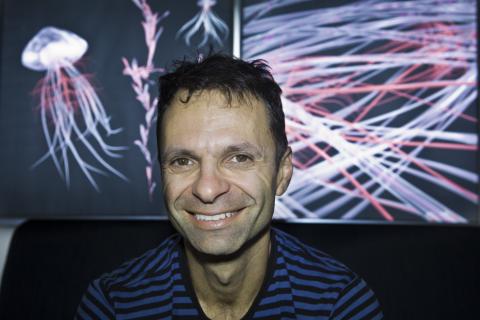Primary supervisor
Alan DorinCo-supervisors
- Anca Hanea (Melbourne University, Australia)
- Martine Barons (University of Warwick, UK)
Research area
Agents and Decision-MakingEcological systems are dynamic and complex. Many ecosystems support human food production and in turn are impacted by human food production activity. This creates feedback loops between ecosystems, human society and our agriculture, that are typical of complex systems. Ecosystem and social system modelling therefore, including simulation, can play a key role to understand food production and ecosystem interactions. If used wisely for decision-support, these technologies can help select and implement effective policies. This PhD project, jointly offered by Monash University (Australia) and University of Warwick (UK), explores the design and development of computational Decision Support tools to help us better manage the interactions between beneficial insects, such as bees, and the flowering plants they visit and pollinate.
Bayesian networks (BNs), and other probabilistic graphical models, can provide a visual representation of the underlying structure of a complex system by representing domain experts’ beliefs about the relationships among variables that can be used to describe them. The BN structure, the probability distributions and parameters it is built from, can be derived from data, when it is available in sufficient quantity and of sufficient quality. However, in many cases gaps in knowledge need to be filled using expert knowledge and judgement.
Models such as BNs are typically encoded in computer software and can be used as decision support systems (DSS). These may be used by decision-makers with different domains of expertise than the analysts who built the DSS system. Therefore, considerations of human-user interaction and user interface design are key to the adoption and successful use of DSS. The need for tools that can incorporate diverse sources of data and knowledge, and adapt modelling to the various limitations of representing complex systems while informing decision making, generates many interesting theoretical and practical questions.
This PhD research focuses on decision support systems in the ecosystem and food security domains. It explores the use of BNs and DSSs as a data source, and (semi-)structured expert judgement (SEJ) and knowledge elicitation to assess the reliability of data to inform data collection strategies and monitoring techniques. The focus of this PhD study is the management of interactions between pollinator insects, such as bees, and the wild native flowering plants, weeds, and human food crop flowers that they visit.
Further reading:
- European Food safety Authority (EFSA) Journal. 2014;12(6):3734-.
- O'Hagan A. Expert Knowledge Elicitation: Subjective but Scientific. The American Statistician. 2019;73(1):69-81.
- O'Hagan A, Buck C, Daneshkhah A, Eiser J, Garthwaite P, Jenkinson D, et al. Uncertain judgements: Eliciting experts' probabilities: Wiley.; 2006.
- Gosling JP. SHELF: The Sheffield Elicitation Framework. In: Dias LC, Morton A, Quigley J, editors. Elicitation: The Science and Art of Structuring Judgement: Springer; 2018. p. 61-93.
- Hanea AM, McBride MF, Burgman MA, Wintle BC, Fidler F, Flander L, et al. Investigate Discuss Estimate Aggregate for structured expert judgement. International Journal of Forecasting. 2016;..-.
- Cooke R. Experts in uncertainty: Opinion and subjective probability in science: Oxford University Press; 1991.
- French S. Group Consensus Probability Distributions: A Critical Survey. In: Bernardo JM, editor. Bayesian Statistics 2. Oxford, UK: Oxford University Press; 1985. p. 183–202.
- Cain J. Guidelines for using Bayesian networks to support the planning and management of development programmes in the water sector and beyond. Crowmarsh Gifford,Wallingford, Oxon, OX IO 8BB, UK: Centre for Ecology and Hydrology; 2001.
- Nunes J, Barbosa M, Silva L, Gorgônio K, Almeida H, Perkusich A. Issues in the Probability Elicitation Process of Expert-Based Bayesian Networks. In: Vizureanu P, editor. Enhanced Expert Systems2018.
- Laitila P, Virtanen K. Improving Construction of Conditional Probability Tables for Ranked Nodes in Bayesian Networks. IEEE Transactions on Knowledge and Data Engineering 2016;28(7).
- Laitila P, Virtanen K. On Theoretical Principle and Practical Applicability of Ranked Nodes Method for Constructing Conditional Probability Tables of Bayesian Networks. IEEE Transactions on Systems, Man, and Cybernetics: Systems. 2018;99:1-13.
Required knowledge
- It is essential that applicants are competent computer programmers with formal tertiary qualifications in this area to at least Honours level.
- Familiarity and proficiency with statistics and statistical reasoning is also a requirement.
- A keen interest in the ethical application of technology to tackle food security and ecosystem sustainability is highly desirable.
- A demonstrated passion for bees and/or nature is also highly desirable, but formal ecological or biological training is not required.
- Students must be willing to spend substantial parts of their candidature at both Monash University in Melbourne, Australia, and at the University of Warwick in the UK. Funding for this travel will be allocated for successful applicants by the Monash-Warwick Alliance.
